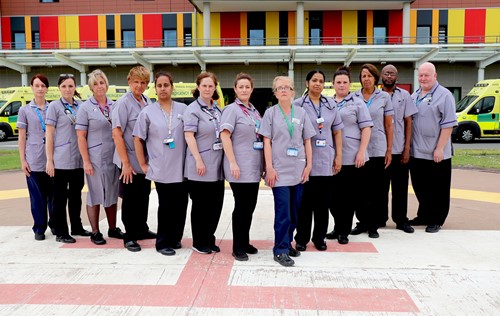It takes thousands of amazing staff to help treat and care for patients at UHNM. Some of them got to feature on TV as part of the latest series of Critical Condition and some of them didn't – but it doesn't matter, they're all stars to us.
From Neurology to Cardiology (that's head to heart, for the non-clinical amongst us!) they work across lots of different specialties to keep patients safe and well cared for.
To find out why our staff love their jobs, click on the profiles and get to know them a bit better. Some of the clinicians and teams listed were on the programme and some work in similar key roles and areas.
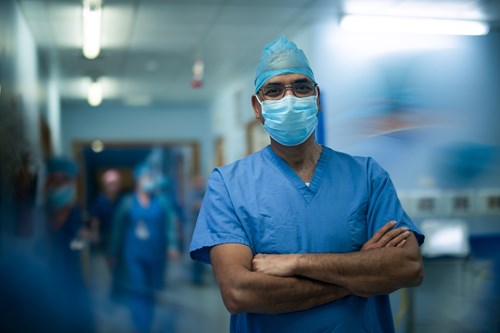
Mr Golash is a Consultant Urological Suregon and Clinical Lead for the Urology department at UHNM.
I always wanted to be a Surgeon as I enjoy doing things with my hands and find it satisfying to see instant results. My father was also a surgeon and this may also have had some influence as well. I went into urological surgery by accident really after I worked with a very good urologist as a junior doctor and was heavily influenced by him.
I have several memorable stories from my career but by far performing the world’s first day case laparoscopic kidney removal and being awarded “Citizen of the Year Award” for this achievement by Staffordshire County Council is the stand out memory for me.
I have a special interest in robotic and keyhole surgery of the kidney and adrenal gland and I am delighted that at UHNM we are able to use the latest robotic technology to benefit our patients
Without a doubt the most favourite thing about my job is the clinical work. I love the interaction with my patients, performing surgery and seeing them get better but unfortunately for every positive there is a downer and the least favourite thing is the need to keep fighting the system to help make improvements and invest in developments for the services we run.
One of the most humbling experiences I have ever had was from one of my cancer patients who kept smiling at me after he had received his diagnosis of cancer. I thought, he probably has not understood the diagnosis and hence I repeated the diagnosis again and he smiled again. When I asked him “are you not shocked”? His words – “Yes, I am. But what can you do? You can either laugh or cry – I choose to laugh”. He taught me a very important life lesson that day.
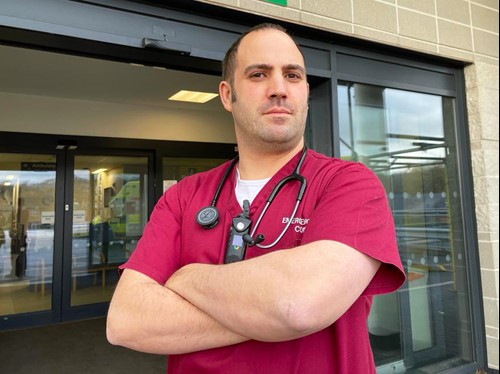
As a teenager I was an avid fan of ER and I think I always wanted to do Emergency Medicine from watching that. There was something about the excitement and the ‘fix anything’ mentality. Once I became a doctor, I was well suited to the nature of the work. Nowhere else would tolerate such a short attention span!
I have worked in Emergency Departments across the world and have a number of memories and experiences. Most notably I met my wife at work in ED, proving not all night shifts are bad.
However, one of my most terrifying experiences was when I worked in Australia. I was quite a junior registrar on my first set of nights and had three extremely sick patients. I was rotating round the patients waiting for signs to intervene on. One required intubation and was referred to intensive care and luckily the others settled down. Thankfully all three survived but it was extremely hairy at one point.
Another Australia memory was when I had to transfer a severely unwell asthmatic patient who was being ventilated. The ventilator could not adequately do the job so I had to hand ventilate (squeeze the bag every 5 seconds) for over an hour ambulance transfer. Both hands could hardly move by the end.
Clinically, I am far more interested in the "fix it now" type cases so injuries and procedural stuff and feel much more at home in the resus department and minors injuries.
Away from the clinical work, I am largely involved in education and am the training programme director for half our West Midlands region.
I've genuinely saved lives and seen incredible tragedy but I've also never laughed more at work over the silliest things. It’s quite dark, but being able to find fun and silliness in all the chaos and pain is probably one of the things I like most in my role.
The least favourite part of the job is sometimes seeing the impact of structural or financial issues on patients.
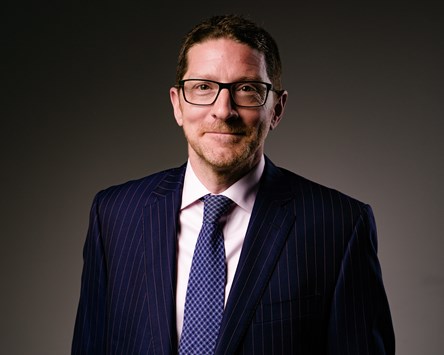
I am a Consultant in Upper Gastrointestinal and Oesophagogastric Surgery based at Royal Stoke University Hospital where we provide specialist services for patients with oesophageal and stomach cancer. I am proud to work here in the seventh largest unit in the UK.
I also provide emergency general surgery services as part of the Trust’s trauma centre status and elective care for complex benign upper gastrointestinal conditions.
From the outset of my medical studies, I have I always wanted to do something challenging and trained in cardiac and liver transplant surgery in London where I developed an interest in the oesophagus. It is a technical challenge from a surgical perspective and also demands an empathic approach and specialist communication skills.
I was attracted to this speciality because of the multi-disciplinary team approach - each patient requires expert input from a variety of healthcare professionals and it is a true team effort.
The specialty is constantly evolving with new therapies and techniques coming on board and there are many debates in oesophagogastric surgery which I have the opportunity to contribute to.
It is always an immense privilege to support patients on their journey, from diagnosis, staging, chemotherapy, major surgery to regular outpatient follow up – often for years afterwards. Seeing patients recover their quality of life after such major surgery is always a memorable experience.
I have a special interest in minimally invasive “keyhole” surgery combined with radical lymph node removal for oesophagogastric cancer. Keyhole surgery for complex hiatal hernias both planned elective surgery and in the emergency setting.
The favourite thing about my job is being able to witness patients recover their quality of life after being diagnosed with cancer and completing major multi-modality treatment and not sure I really have a least favourite part of the job. You take the rough with the smooth and always try to take positives out of any situation. Every day is a school day!
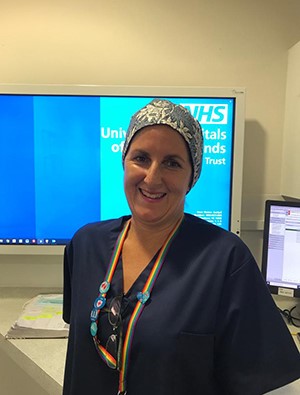
What do you like most about cath lab work?
There is so much variety in what we do. No two days are the same, and the workflow is very fluid. You can plan your schedule and hope for the best, but you're never quite sure what's going to come through the door. There is also the teamwork, which is so important when you’re working in a fluid environment like the lab. You rely on every member of the multidisciplinary team to do their job so that it all comes together for the good of the patient. I manage a team of 31 nurses. One thing I’ve noticed through the years is that when nurses come to work in the cath lab they tend to want to stay there. On a personal note, we are somewhat of an older workforce in our group because most of us came to cath lab work from an early age and stayed here, which is really quite nice.
Can you give us some insight into the environment and workflow at your hospital?
When I first started here 28 years ago we had one lab. We now have four labs in total: two that predominantly do electrophysiology procedures and two that handle angiography and structural work. Each year we do over 2,000 cases of radial angiography and angioplasty, about 2,000 pacemakers, 350 ICDs, 450 loop recorders, and about 450 electrophysiological studies. So, we are a busy hospital and our labs run 5 days a week virtually nonstop. We have also had to add evening sessions as needed for in-patient procedures because we are finding that there is an increase in volume of those cases, some of them as a result of interhospital transfers.
What is a typical day for you?
My job is essentially to plan and coordinate the flow of work through the lab. However, there are many days where I may be working in the recovery bay looking after patients postprocedure or preparing them for a procedure. Today, for example, we've had some very sick patients. We've done four TAVIs, and we've had a couple of complications. I go where I’m needed depending on staffing on any particular day. Technically, my role is that of a manager, and I do all of the things required of a manager, including paperwork and staff management. But, I am very much a hands-on person. I’m going to be out there putting my heart and soul into the clinical side of things, and then I’m going to get my management work done—in that order. We all strive to make sure that the clinical side of what we do is done right and that patients are treated properly.
What are some of the most striking changes that you’ve seen in interventional cardiology during the years you’ve worked in the cath lab?
A change from femoral to radial angiography was one of the first really big changes that I witnessed. That happened early in my career in the late 1990s. We were the first big center in the UK to change over to doing interventional procedures radially, and today 95% of all transcatheter cases that are done here are performed with a radial approach. The next major shift was probably when primary angioplasty became the treatment of choice for acute MI. It’s easy to forget, but it was quite a big deal at the time and not everyone was happy about it. More recently, we’ve had the advent of TAVI and seen more structural procedures coming into the cath lab than ever before. Currently, our aortic stenosis patients undergoing TAVI go home at 36 hours after the procedure, which is a huge change from the early days of TAVI. Another change that we are proud of is increased involvement of nurses in a number of procedures. For example, we have a nurse who can do coronary angiography, and we also have a few who do loop recorders. What’s interesting is that our physicians rarely do loop recorders anymore, they are mostly done by our specialized nurses.
Are you still feeling the impact of the COVID-19 pandemic on your cath lab?
Yes, most definitely. Right now we are having challenges getting patients into the hospital for a number of reasons related to ambulance services and wait times. We also are continuing to deal with staff shortages due to patient volume and staff illness. We’ve had peaks and troughs with the shortages, and it is frustrating, because you think you're coming through the worst of it and the next thing you know you’re back in it again with another surge.
Nonetheless, we have kept busy as a cath lab throughout the pandemic. We've got three cardiology wards that we work closely with and one of them was converted into a COVID ward at the very heart of the pandemic. Like many other hospitals, we redeployed some cath lab staff to help with COVID patients as necessary. Fortunately, that ward has now been converted back to a cardiology ward, but I think we all still have an ongoing feeling of unease not knowing when we will truly get back to normal.
What are some things you enjoy doing in your free time?
My sister and my nephew have a farm, and it’s great to spend time out there. It’s a wonderful outlet to get away from everything and be in the fresh air. They have sheep on the farm, so in the Spring when the lambs are being born I go there and help deliver them. My sister is amazing at it and such a hard worker. I feel so fortunate to be able to live close and experience something that is so different from what I do all day in the hospital. My nephew also has a daughter who is 4 years old, and I enjoy spending time with her there as well. We do lots of fun things that keep me on my toes!
I am originally from Manchester, but moved to Stoke in 2004 to start my Medical Degree at Keele University as one of the first students to be wholly taught and examined by them. Since graduating in 2009 I have worked around the West Midlands and in North Wales.
When I started medical school, my interests were based around resuscitation and caring for the sickest patients, which led me to develop an interest in Anaesthesia, as we work across a wide range of areas, looking after those having elective surgery and those needing intensive care support. My interests have now led me to focus more on paediatric anaesthesia and major trauma/resuscitation such as that seen in Critical Condition.
As an anaesthetist at RSUH, my job is one of the most varied in the hospital. Over a 12-hour shift I can anaesthetise anyone from a woman for Caesarean section, a bleed on the brain, a ruptured aneurysm or someone needing an abscess drain. The variety is one of the best parts of my job, combined with the satisfaction of being able to see rapid results from the things we do for patients under our care in theatre.
Bizarrely though, if we do our job well, very few of our patients or their relatives will ever even remember who we are! Over the past 15 years I have seen RSUH and medicine in general change rapidly. We are growing busier day-to-day, with new treatments being developed continuously. Anaesthetists are part of many of these developments and our skills are used to keep patients stable and safe throughout their procedures. We are always there in the background, keeping things going.
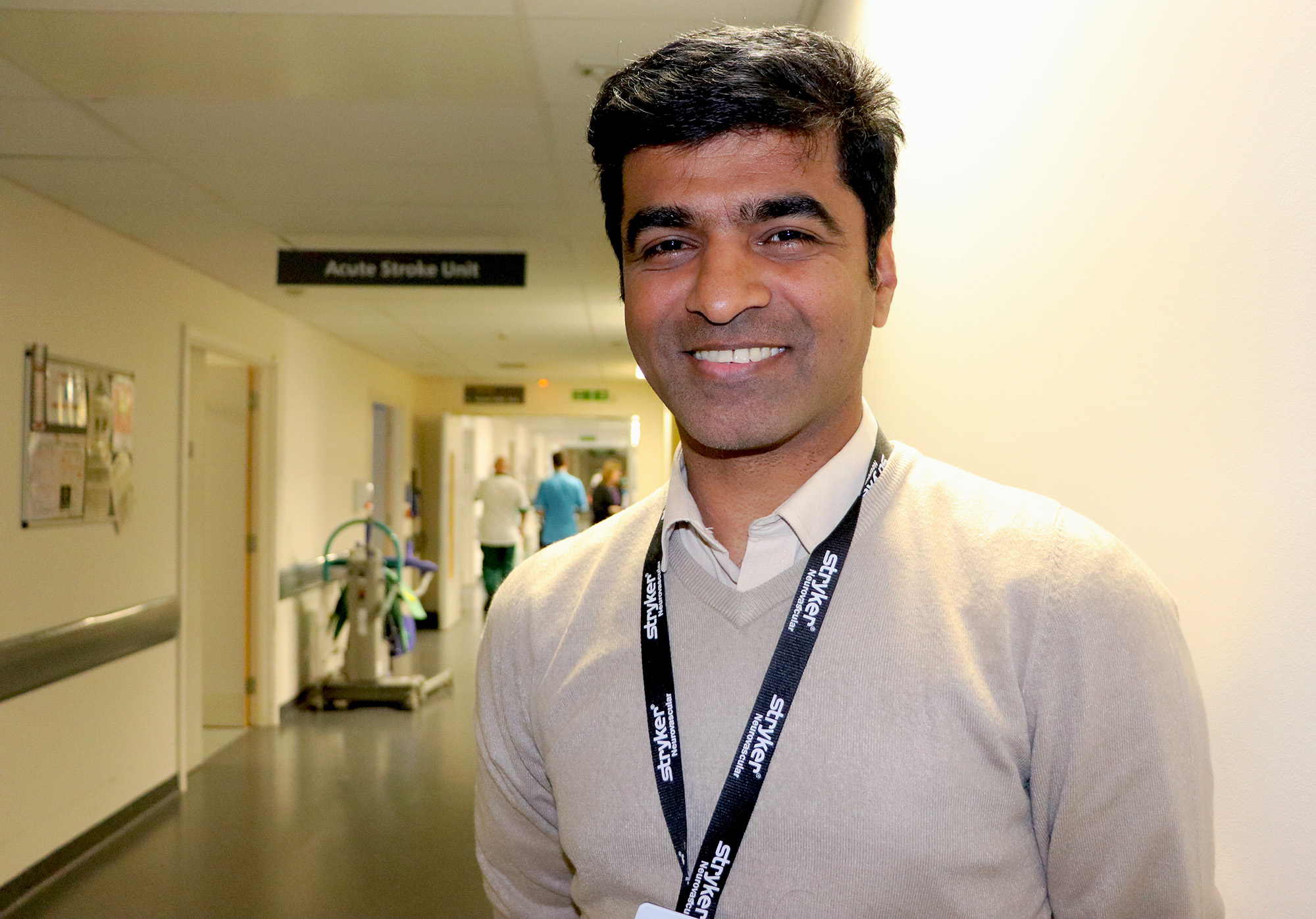
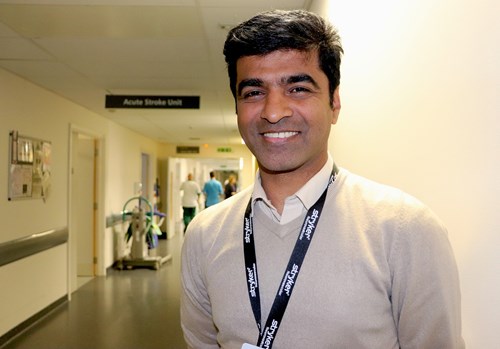
On completing his medical training in India, Dr Girish Muddegowda, UHNM Deputy Stroke Lead, immigrated to UK in 2004 for further postgraduate training.
He says: "I was interested in acute neurology and decided to pursue my interest in the field of neurovascular science. I spent my initial training days in the Black Country area focussing on acute stroke care. I was an active member in a 24/7 thrombolysis team where I gained much of my acute stroke care experience and then moved on to different hospitals across the Midlands gaining more experience in the field of stroke medicine.
"I did my fellowship in hyperacute stroke care at UHNM and joined the consultant team here in 2015. I am the lead for clinical governance for stroke and lead the hyperacute stroke service at Leighton Hospital. I have a special interest in endovascular treatment for hyperacute strokes and also haemorrhagic strokes."
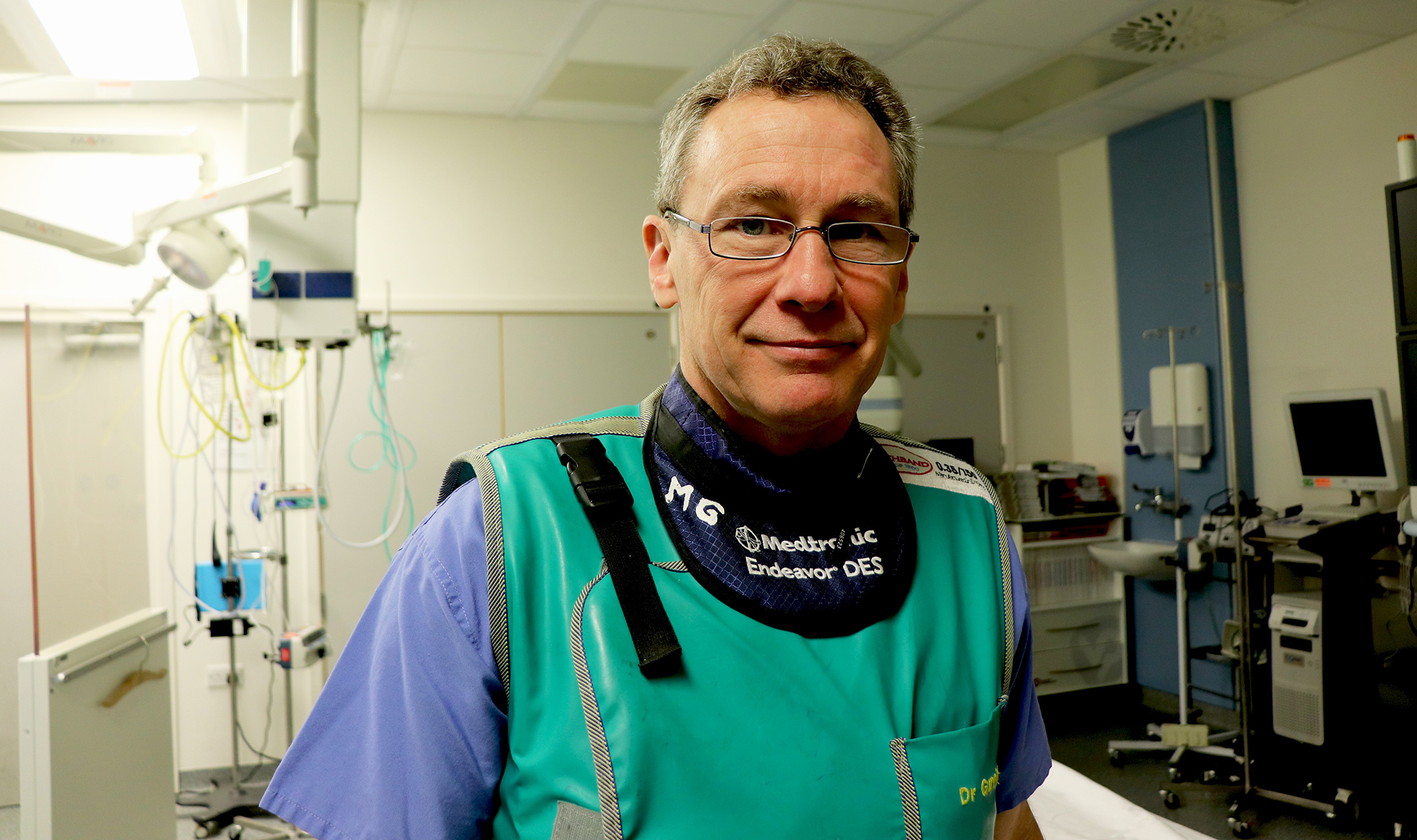
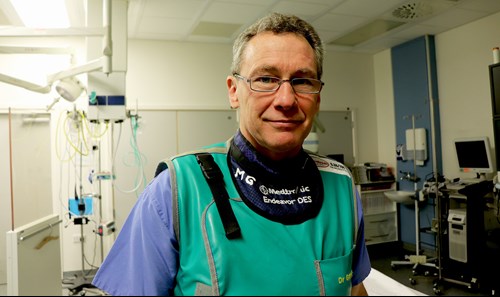
Hailing from South Africa, Mark Gunning, Consultant Interventional Cardiologist, qualified in Capetown in 1988, and has worked in the NHS since 1991. All of his cardiology higher training was undertaken in London, and he took up his post at University Hospitals of North Midlands post in 2003.
He says: "It has been a privilege to work in cardiology through a period of very significant evolution. The treatments we are able to offer now, for a whole range of cardiac conditions, are markedly superior to those at our disposal when I first qualified over 25 years ago.
"Important landmarks on that timeline include the introduction of intra-coronary stents, the development of primary angioplasty as a treatment for myocardial infarction (heart attack), and the introduction of TAVI - a means of replacing a diseased heart valve without the need for open heart surgery.
"Unequivocally the best part of my job is interacting with and treating patients. This is particularly rewarding when helping someone who is critically unwell. When they arrive within the department for emergency treatment, we are able to offer swift relief for symptoms, but also on occasion, life-saving treatment. All these years down the line, I still relish front-line medicine."
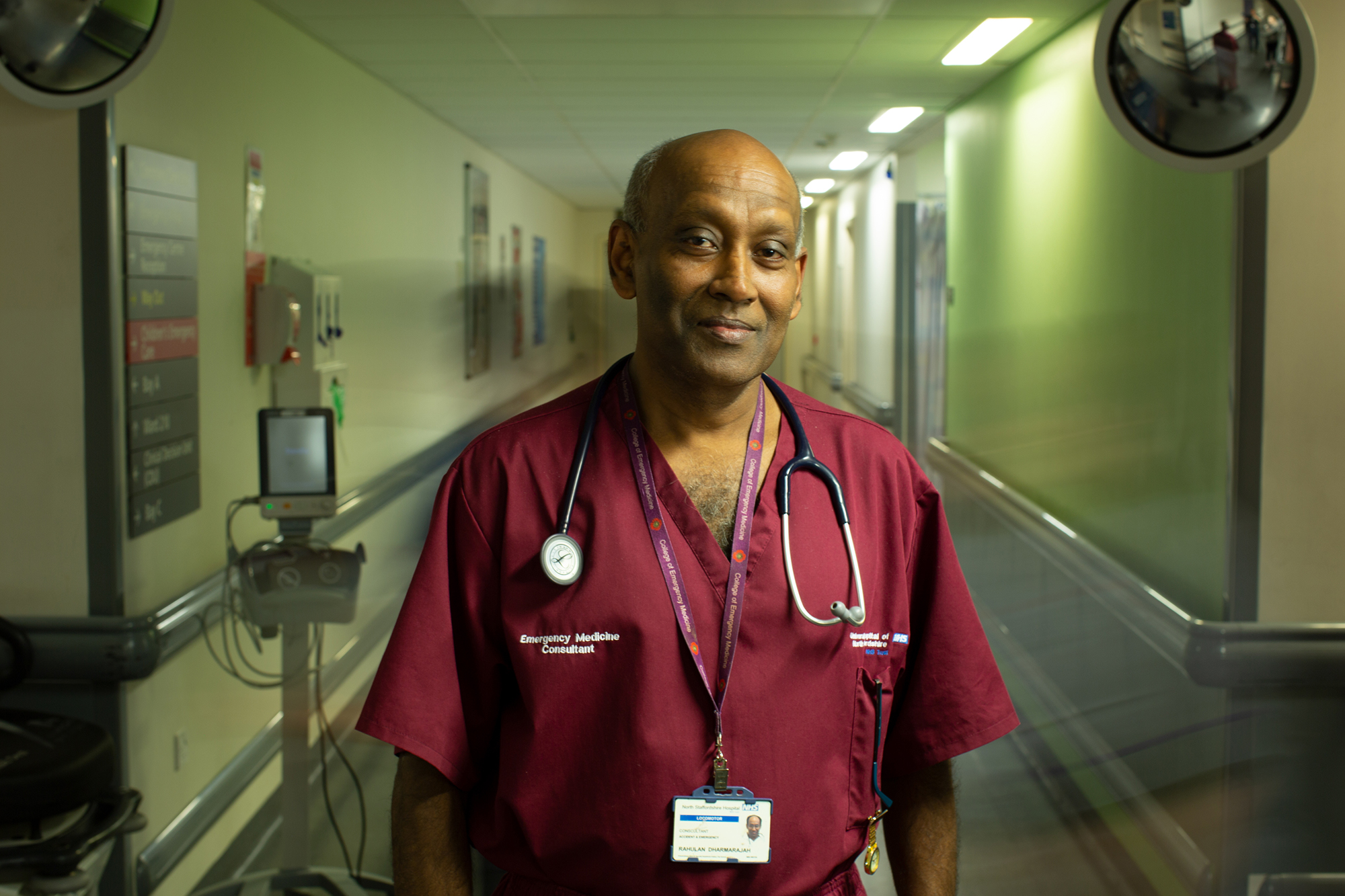
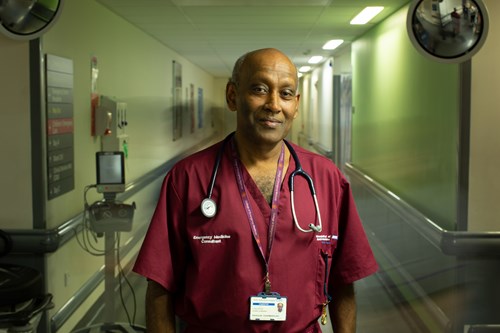
Born in Sri Lanka, Emergency Medicine Consultant Raj and was already half way through his post graduate training when he took the decision to leave his country because of the civil unrest. He arrived in the UK in 1990 having witnessed indescribable injuries from the victims of the war and embarked his career in a number of hospitals before settling in Stoke.
Now retired, but unable to keep away from the thrill and excitement of working in emergency, Raj continues to work shifts at the Emergency Department at Royal Stoke University Hospital.
He said: "I originally wanted to go into surgical training but my first job was in A&E and I loved it and quickly decided on a career change. I began my new role at the A&E department in King-Lynn and was soon thrown in the deep-end, having to get straight to work without an induction of any kind – a theme which continued on my arrival in Stoke in 1994. I was placed on-call straight away but luckily I was well looked after by colleagues, particularly the sisters. The department here is like an extended family, we look after each and the support we provide each other is reflected in the fact that that our registrars frequently return to work for us.
"I was put on the Monday shift, which for anyone who knows an Emergency Department, knows it's the busy one! A typical day brings a lot of challenges so the day just flies past. The job is so varied and I love the problem solving, dealing with issues, supporting staff and overall looking after patients. It is the patients who have made me a better person, personally and a better doctor clinically.
"I am proud to work for the NHS – it is the best insurance we can offer people - and in ED we work hard as a team to provide the best possible care to our patients. For me, the hardest part of my job is that this isn't always reflected or appreciated elsewhere in the NHS."
Major Trauma Centre
As one of just three EM consultants in post when the Trust was putting a bid in to have Major Trauma Centre status, Raj found himself in the unique position of providing advice and support in the design of the centre.
"I was able to tour other centres and see what worked well and what didn't and use all that feedback to create the MTC we have here at Stoke today. Obviously there are things that could be changed but I am immensely proud to have been involved in the centre's creation which now saves the lives of so many people on a daily basis," he said.
However, the 60 –year-old, credits the success of the Emergency Department and the MTC on all the staff who work there.
"It's the whole team, from the porters and cleaners to the nurses and consultants and beyond who make this department work so well. Everyone has a role to play in helping a patient when they arrive in the ED. Whether it is ensuring the bay is clean and prepped for patient arrival to the consultants making critical decisions about patient care – we all play a part – and I hope to continue to play mine for more years to come."
Vinayak is an intervention fellow who came to Royal Stoke University Hospital a year ago from Australia.
Born in India, his father was in the Indian Army and therefore he travelled a lot around the country during his childhood. As a result he was educated in four different schools across India and never really settled anywhere.
After initially qualifying in medicine in India he moved to Australia to experience new health and care systems and to start his medical career. He lived in Australia for nearly eight years before moving to Stoke following a chance meeting with Professor James Nolan, consultant cardiologist at UHNM at a conference in Paris.
He says: "My father is the reason why I took up medicine but I love the idea of providing unconditional care to those who need it and to helping people who are in poor shape and give them better opportunities for living a healthy long life.
"It was my meeting Professor Nolan that led to my decision to work in Stoke-on-Trent. He was very warm and welcoming but what really excited me was the fact the UHNM is a centre of excellence and a large teriatry centre.
"I have had a brilliant year in Stoke-on-Trent and my colleagues have been encouraging and courageous in their teaching and I have really appreciated the work ethic in the team which makes me want to be the best clinician I can be."
He is a keen swimmer and runner and after coming from Australia, Vinayak has taken advantage of living so close to other countries and has run half marathons in 10 different countries since moving to the UK!
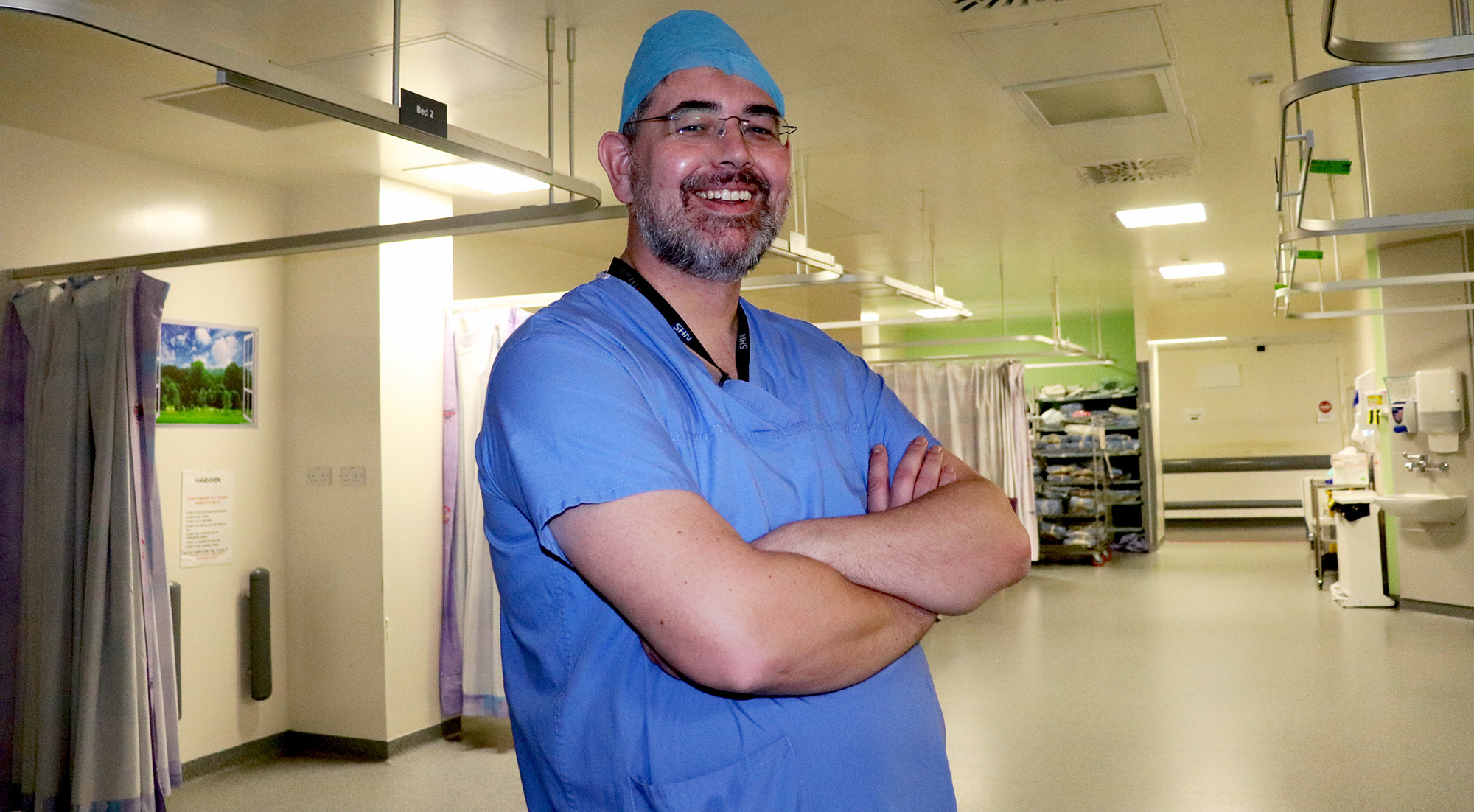
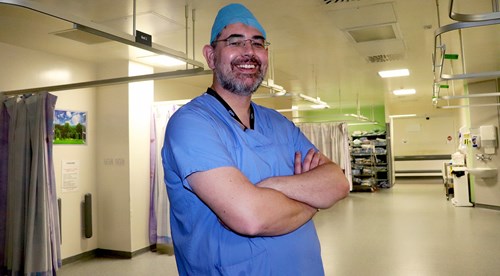
"I studied medicine to try to make people lives better and surgery specifically because I enjoy the skill and diversity of the work my job entails.
"My journey to becoming a colorectal consultant has taken 21 years from finishing my A-levels. I spent five years at medical school followed by a year as a pre-registration house officer as what is now called an F1. Having spent four years after that as a senior house officer during which time I sat and passed the examinations for four surgical colleges, I then spent two and a half years in research looking at cell shedding in the gut and obtained an MD from the University of Liverpool. I then spent seven years as a registrar and a year on a fellowship at the Christie Hospital in Manchester.
"I have also spent time working in Africa, which helped me to understand how working with very little resources can sometimes make some of the biggest differences.
"I am the Lead for audit in general surgery at UHNM and am one of two links to gynaecology for the management of colo-endometriosis. I am interested in the management of complex incisional hernias and I teach advanced trauma life support courses both at the Trust and nationally.
"My favourite thing about my job is the colleagues I work with. I count myself lucky to have found such a good department to work in."
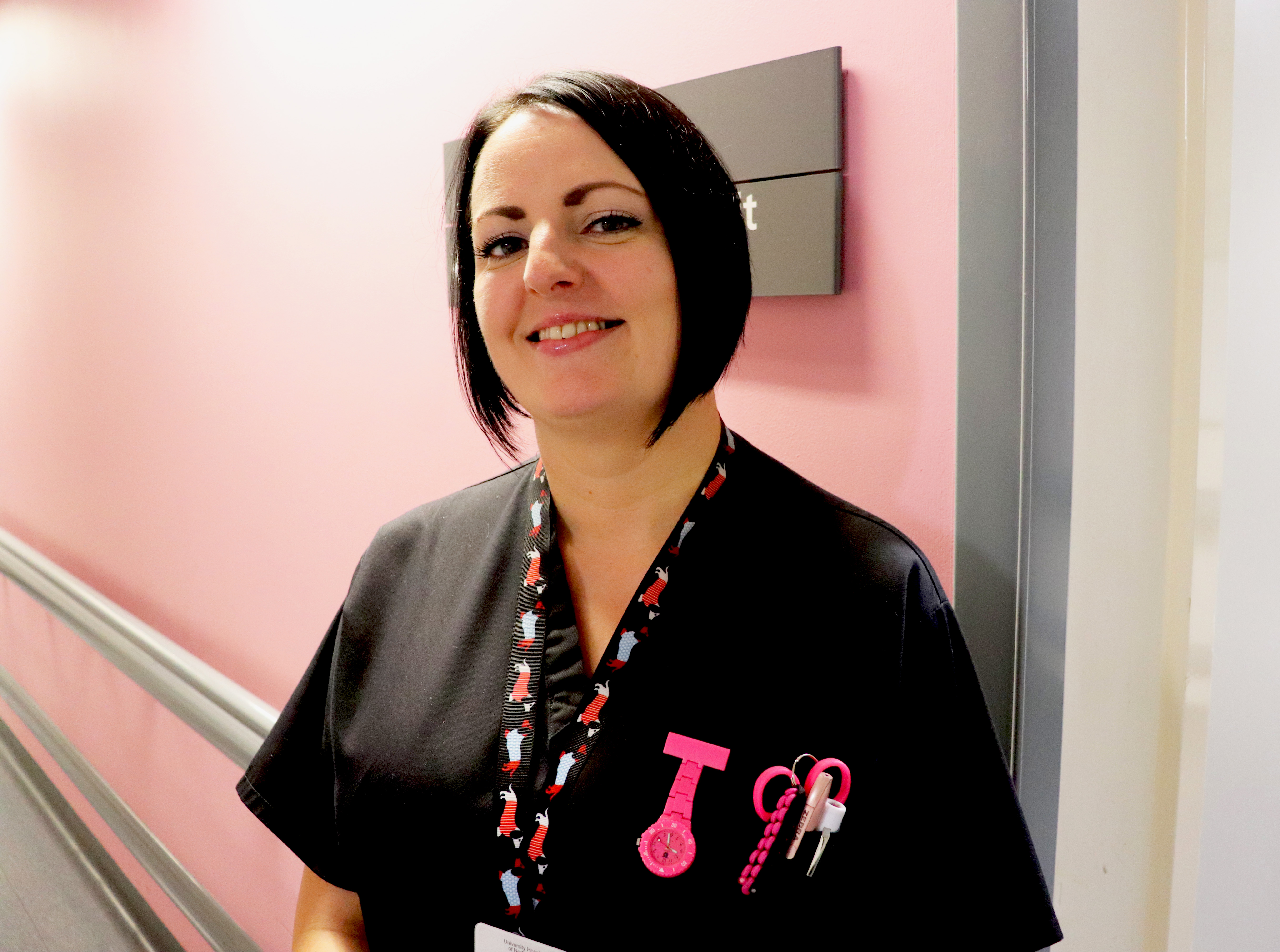
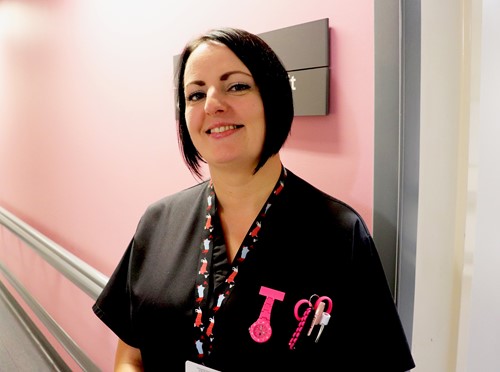
Donna initially started her working life as a medical receptionist but felt she had more to offer patients and that is when she took the decision to train and start her nursing career. Donna has worked in the A&E department at Royal Stoke since qualifying from Keele University in 2007. In addition to being a Senior Staff Nurse she is the Senior Quality Nurse for the department focusing on UHNM’s quality agenda.
She says:
“My days are really varied spending two thirds of my time on the shop floor clinically looking after patients and a third focusing on quality, safety and patient experience. As part of this role, I help identify and lead on quality improvement programmes, lead on specific initiatives at ward level, share and implement learning and knowledge while supporting governance, clinical audit team and the safety and compliance team.
“Clinically, every day is just as varied. I learned early on in my career that to work in the emergency department was my calling in life. I thrive on the fast paced, high pressured environment, where patients are often in a critical condition or in a highly anxious state.
“Making decisions which impact on patient’s lives daily is a great responsibility and as a nurse I am honoured, as are my colleagues, to provide care for people and their families often at the worst point of their lives.
“The A&E team works as one to achieve the goal of providing the best possible care we can to everyone while supporting each other. We are all part of the A&E family and even though we have a very large amount of staff in the department, we support and encourage each other regardless of job role or position which is why I have probably stayed in the department for as long as I have.”
The Trauma, Resuscitation Anaesthetist is a fairly new and really innovative role that major trauma patients at Royal Stoke University Hospital really benefit from. The role offers expert management, advice and interventions to stabilise acutely injured patients and resuscitate them to enable repair of traumatic wounds.
The TRA works alongside the Trauma Team Leader in the Emergency Department, as a second consultant, to plan how to manage a patient as they come through the door but they are also very 'hands on'. If the patient needs to be anaesthetised and put on a ventilator then they are able to do this, even when the patient is very unstable, where a general anaesthetic would normally be highly risky.
If urgent access to a patient's circulation to give rapid blood transfusion, very potent medications or any other treatment is needed, then the TRA is expert in placing these lines even in the most shocked of patients. Where patients are in severe pain the TRA can manage the most advanced forms of analgesia such as complex regional and nerve blocks, alongside very potent pain relieving medication to make their journey through the process much more comfortable.
As part of the wider treatment modalities in the hospital, the TRAs have strong links with theatres, critical care and with interventional radiology, so that whether the patient needs emergency surgery or stabilisation on critical care, they routinely work in those areas, so can facilitate this smoothly and efficiently.
Anaesthetists are often working in the background of most emergency, critical and acute care areas. From patients who are having cardiac surgery to brain surgery, from complex vascular repairs to extreme orthopaedic surgery, from outpatient endoscopic procedures to planned and unplanned obstetric procedures, anaesthetists are integral in managing these patients.
The team form the basis of critical care consultant teams and are called for all complex cardiac arrests around the hospital, if unstable patients are moved between hospitals they are the doctors who manage them. But at the same time we manage pain relief acutely and chronically, assess patients who are planning elective surgery and form part of the management teams who advise on how departments in the hospital run.
All of the TRAs at UHNM work in the prehospital environment also, working on helicopter emergency services, prehospital ambulance based services and also respond from home on blue lights for the ambulance service to support their paramedics. The team work in a mix of geographical locations and so work within multiple counties within both England and Wales.
Each consultant has a background in anaesthesia with training in critical care so after qualifying medically as doctors specialise in working within theatres to manage patients through wide varieties of anaesthesia and resuscitation. The TRAs are mostly found in operating theatres, working on often the most sick and complex of patients, but each also has various other areas that they will cover.
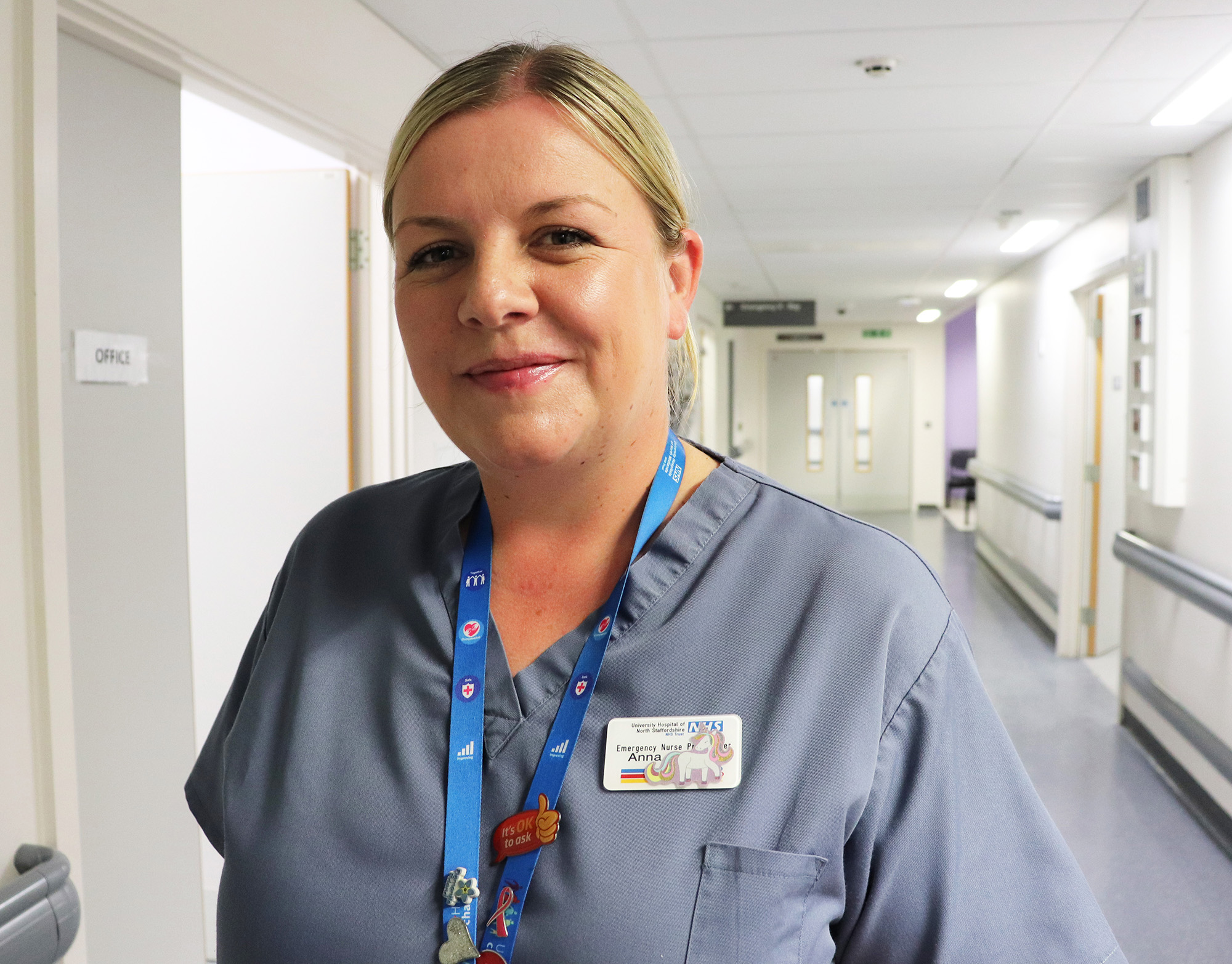
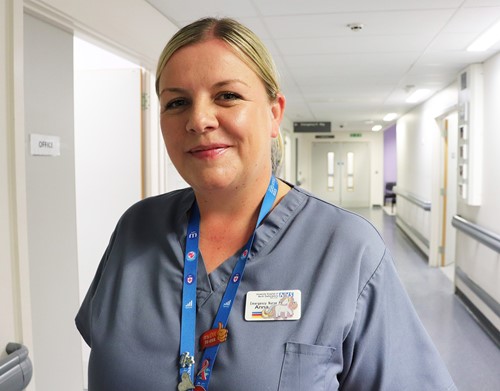
Anna Forrest has worked in UHNM’s Emergency Department for more than 10 years having joined the organisation following a short stint on cruise ships as a nursing officer and brief experience at Charring Cross Hospital’s A&E department. She has been an Emergency Nurse Practitioner for five years and describes what it’s all about here.
“The ENP role is one of a senior emergency department nurse who is trained to see and treat minor injuries. We are qualified to assess, treat and discharge - we are the only nurse practitioners in the Trust who can discharge autonomously.
“Our role provides continuity within the department and we are able to support other colleagues and offer advice when required.
“We demonstrate our competency by applying standard care guidelines in our clinical practice to provide our patients with the best care possible.
“This role has evolved over the last few years allowing us to undertake many different procedures which previously the patient may have had a long wait for a referral to a speciality. This includes manipulation of dislocations or fractures.
“Each day is very different and we don't know what we are going to see next. From foreign bodies in eyes to foreign bodies in all sorts of other places! Fractures, wounds, chest injuries, back injuries.
“Every day is a school day and there is so much to learn - we actually see less 'minor' injuries many are very complex and some may involve us asking for a speciality opinion or a senior review.
“I love the satisfaction I get from my job. We are able to provide a seamless journey for the patient from assessment to discharge. I really enjoy meeting all different people from all walks of life and often they have a story about something!”
Emergency Department Advanced Practitioner Team
The role of an Emergency Department Advanced Nurse Practitioners (ANPs) brings extensive experience combined with expert training and knowledge to a fast moving and varied department
During the last 15 years the team has grown from just two to its current team of 17. Most are senior nurses who work closely with the senior doctors in the department to ensure the best outcome for each patient.
Patients are often seen exclusively by an ANP/ Advanced Care Provider (ACP) and will not physically see a doctor but the practitioner will have discussed each case with the doctor in charge in order to agree a plan.
The role is varied and ANPs need to adapt quickly and deploy different skills at different times, often going from seeing patients in the minor ailments/ injuries area of the department to leading a cardiac arrest team in the resuscitation area at a moment’s notice.
If a patient requires referral to a speciality team for further treatment the ANP/ ACP will refer directly to the senior doctor in that speciality, making them an integral part of the multi-disciplinary team.
The ANP/ ACP team cover both day and night shifts within the emergency department and at the beginning of each shift an individual practitioner will liaise with the consultant in charge of the department to determine which area of the department they will work in.
Once in this area the practitioner will begin seeing patients either depending on who has been waiting longest or if any patient has been identified as a clinical priority by the triage team.
Based at both Royal Stoke University Hospital and County Hospital emergency departments the current team started careers either in the emergency department or in acute medicine, cardiology, stroke care, the military as well as from pharmacy.
All ANPs/ ACPs take their original qualifications and experience and then must work towards a Master’s degree in Advanced Practice, including qualifying as an Independent Nurse Prescriber, and Advanced Life Support certification among other training courses in order to work as an advanced practitioner.
Over time the clinical practical skills that ANPs/ ACPs train in has expanded significantly and range from basic skills such as taking bloods and wound closure to advanced skills such as inserting chest drains to treat collapsed lungs or central venous access lines (long cannulas which go into blood vessels in the neck) to treat patients with circulatory compromise. These skills are in large part taught and assessed by the consultants within the department in the same way that junior doctors have been taught them for many years.
Recently the Royal College of Emergency Medicine, the governing body for doctors working in emergency departments, has developed a system of recognising qualified ANPs/ ACPs.
Individual practitioners are assessed against the same list of competencies the Royal College uses to assess its Registrar level doctors and if they can demonstrate competence can be accredited by the Royal College in recognition of their proven competency. Royal Stoke emergency department became one of the first in the country to have a practitioner in the country to achieve this, and other members of the team are hoping to follow.
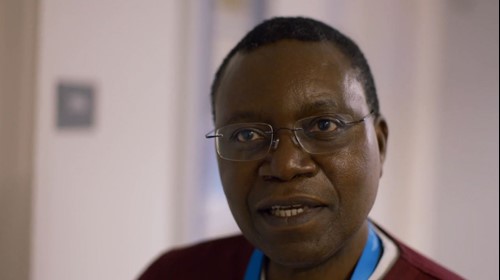
Moses Chikungwa is Consultant in Intensive Care Medicine (Critical Care) and Anaesthesia and is part of the Intensive Care Unit Team looking after the sickest patients at royal Stoke University Hospital.
The ITU Team is made up of consultants, trainees, advanced critical care practitioners and nurse and as a consultant Moses’ role is to review all referrals for admission to ICU to determine urgency, appropriateness and therapeutic interventions to be offered for the specific clinical condition.
He said: “This kind of work is quite challenging because of the extreme clinical state of most of the patients we admit to ICU. The therapeutic interventions and care are very intense and can be both physically and emotionally draining. Hence this is a specialty with one of the highest ‘burn out’ rate in the whole medical field!
“Critical care capacity is a scarce resource in the UK and world over. As an admitting Critical Care consultant you always have to select and prioritise the admissions. This is the bit which every Critical Care consultant hates and finds challenging.”
“Despite all these challenges, I still enjoy this field. It’s very rewarding when you see some of those who were close to dying actually wave at the team as they leave to step down to a general ward area.”
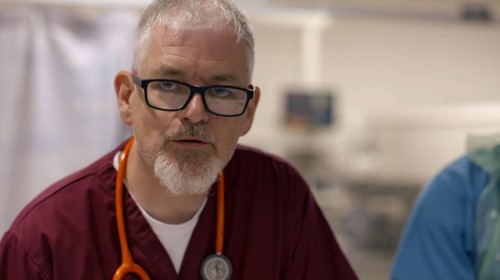
Dr Anthony Taylor is one of just eight Associate Specialists at University Hospital of North Midlands. He is also a Trauma Team Leader.
He initially joined University Hospitals of North Midlands for 11 weeks as a GP trainee in 1997.
He says: “On my second day I found myself in resus doing internal cardiac massage on an arrested patient, thinking ‘We're not in Kansas any more, Auntie Em’ and somehow I don't really seem to have left.
“I have so many memorable experiences working in the emergency department - far too many to list, and some not to be repeated! However, there was a patient who has always stuck with me. I was looking after a 94-year-old D-day veteran who'd fallen off a treadmill and he insisted on showing me he could still do a headstand, and then thanked me profusely on the way out, when clearly the gratitude gradient should have been flowing the other way. It's a privilege to look after people.”
Anthony has a special interest in medical education and is involved in the Trust appraisal and educational supervision and examining for the medical school. He describes education as the “magic bullet”.
An advocate for our patients, Anthony says the challenging part of his job is the sometimes lengthy and unnecessary bureaucratic processes required which can feel like it prevents delivering the care the patients need. The best bit about the job is the friends he has made saying his colleagues in the Emergency Department are like family.
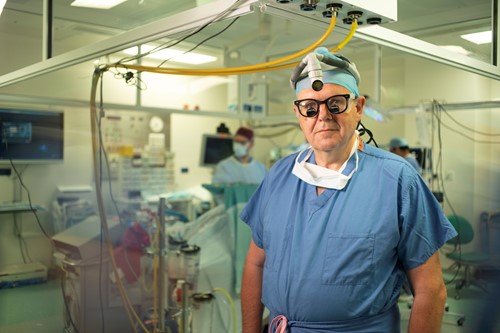
Mr Ridley, 63-years-old was appointed a consultant cardiothoracic surgeon in Stoke-on Trent in 1997 is now the senior surgeon in the department. His interest is in adult cardiac surgery and areas of interest are valvular heart surgery and surgery for cardiac arrhythmias. As seen in Series 2 Episode 5 of 999 Critical Condition he performs coronary artery bypass graft surgery at the Royal Stoke. He said today:
“We work as a team of cardiothoracic surgeons and cover the greater Stoke-on-Trent region as a team of cardiothoracic surgeons so I am regularly on the rota to be on call for emergency surgery. As a team, we care for our patients preoperatively and postoperatively and cover the cardiac intensive care unit. I have been much involved in developing surgery for repair of the mitral valve and surgery for atrial fibrillation at Royal Stoke University Hospital and have a number of peer reviewed scientific publications.
“I am involved each year in the training of junior doctors and medical students but my role is primarily clinical. The position of consultant cardiothoracic surgeon is a privilege and we have a mission by means of heart surgery to relieve symptoms, prolong life and on occasion save life in patients with heart disease who present to our unit.”
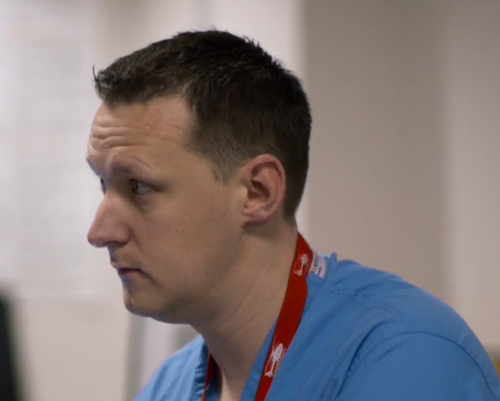
Dr Matthew Rowley is an anaesthetist at Royal Stoke and is also a Trauma Resuscitation Anaesthetist (TRA). His job includes routine and emergency anaesthesia in the operating theatres and also managing major trauma patients in the emergency department alongside the trauma team leader (TTL).
He said: “I find treating critically ill and injured patients a very challenging and rewarding part of my job especially when we get to see positive outcomes at the end. I have a special interest in trauma resuscitation and also pre-hospital emergency medicine. As such I work as a Helicopter Emergency Medical Service (HEMS) Doctor for Midlands Air Ambulance.
“I have spent a significant period of time at Royal Stoke and built strong links with staff over the years and seen the hospital develop as the successful major trauma centre it is today.”

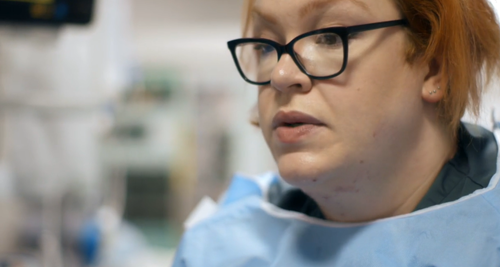
I was born and raised in Newcastle-under-Lyme until I ran away to Dundee University at 18 years old vowing never to return to Staffordshire. After I qualified, I spent 10 years in Norwich and Norfolk. Five years ago I returned to Stoke for family reasons (and the promise of unlimited supplies of Oatcakes). I joined the team at UHNM ED and I’ve never looked back.
I am a Specialty Doctor (SAS) in Emergency Medicine which means I’m not a consultant nor in a training programme to become one. However, I have been working in Emergency Medicine for more than 11 years and love the variety and challenges it brings. I like the way Emergency Medicine makes me use the creative parts of my brain to best look after my patients. By far the best bit about Emergency Medicine is the team – they’re my second family. I feel privileged to work beside such a diverse and skilled group that I get to learn from on a daily basis.
Being a SAS doctor has allowed me to develop a portfolio career; I love teaching and instruct on some of the life support and trauma care courses that we hold. I am an Educational Supervisor to doctors that have just qualified and support them through their first year as a doctor. My other passion is Staff Wellbeing, and this has been more important than ever in 2020. In February this year I was appointed SAS Tutor at UHNM. I can now combine my love of Education and Wellbeing by supporting the 116 SAS doctors with their career development. SAS doctors are an important part of the NHS workforce as a whole and we have 18 in ED at UHNM.
Outside work I enjoy spending time with my family, I have a young son who keeps me busy. I love crafts and spend a lot of time at my sewing machine making clothes for myself, my son and very occasionally, my husband.
I am Consultant Oesophagogastric and General Surgeon at the University Hospitals of North Midlands. The majority of my work is within the North Midlands Oesophagogastric Unit where I contribute, along with a multidisciplinary team of specialists, to the management of patients with oesophageal and gastric cancer.
I also contribute to the emergency general surgery service at UHNM as part of its major trauma centre status.
I pursued the field of surgery because performing an operation and making an almost immediate difference, which can be life-changing, is a real privilege.
The best part of my job is performing complex surgery and achieving great outcomes for our patients. Forming that unique bond with a patient and their relatives is really special.
I also enjoy working with a great team of healthcare professionals at UHNM, who have a shared vision.
The least favourite part of my job is when patients sustain a serious complication, which can be devastating for all involved. Complications, however, go hand in hand with complex surgery and it helps to have a supportive team around you.
One of my mottos for our postgraduate doctors in training is “surgery is like a game of chess, you always need to think two moves ahead.”
I also have a vested interest in training the next generation of surgeons. This is through my role as an Educational Lead, Higher Surgical Training Committee Member and as one of the Royal College Tutors at UHNM.
Most of my spare time is consumed by a juggling a busy family life, which involves our three growing boys and acting as a taxi service. When I do get a chance, I love to go trail biking in the hills of Shropshire or Cannock Chase.



















